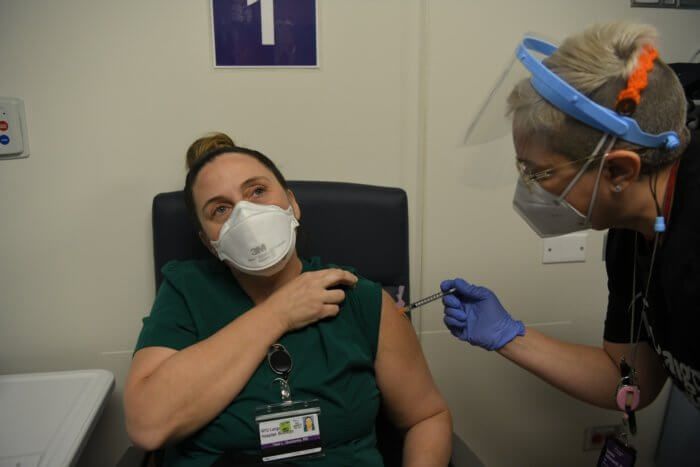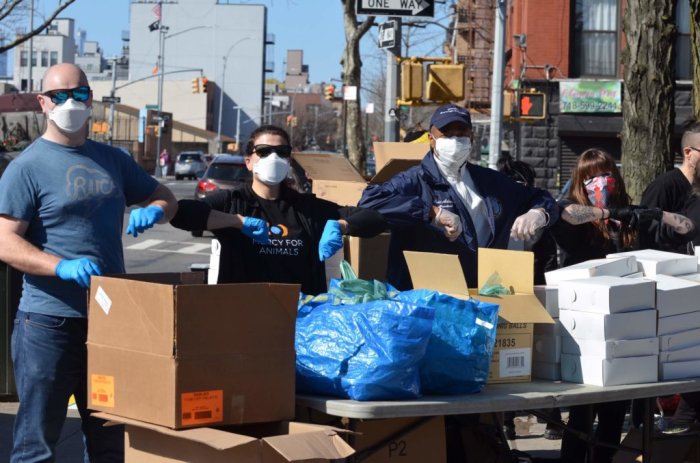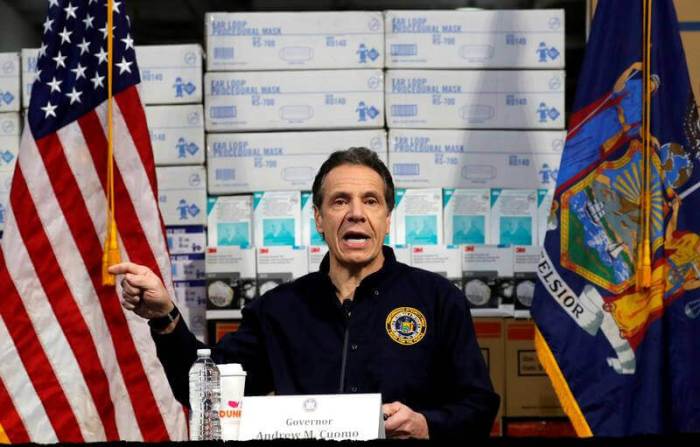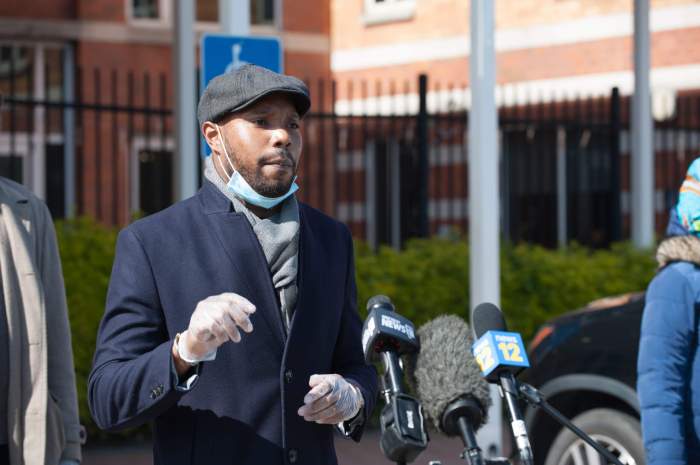The first COVID-19 vaccines arrived at New York City hospitals Monday, kicking off a historic effort to immunize New Yorkers in the months ahead, according to Mayor Bill de Blasio.
“We now begin, today, the largest vaccination effort in the history of New York City,” de Blasio said at his Dec. 14 press briefing. “This will be remembered as the day where the largest mobilization ever was undertaken to protect the people of this city, the largest vaccination effort in our history.”
Doses of the vaccine by pharmaceutical companies Pfizer and BioNTech arrived from a Michigan factory straight to Big Apple hospitals, where healthcare workers were first in line to get their shots against the highly-contagious virus.
Critical care nurse Sandra Lindsay at Long Island Jewish Medical Center in Queens was the first person in the city to be injected with the vaccine Monday morning.
The shipments of some 73,000 initial doses are slated to arrive at five hospitals Monday, followed by 37 facilities Tuesday, and another two on Wednesday. Those vaccinations will be administered to healthcare workers during the coming week to week-and-a-half, according to the city’s Health Commissioner Dave Chokshi.
Some 10,000 doses will be administered across New York State Monday, Gov. Andrew Cuomo said.
Health officials declined to disclose which specific facilities were getting the vaccines or when the first will arrive in Brooklyn, but de Blasio also dropped by an NYU-Langone outpost in Manhattan Monday afternoon to watch early injections roll out there.
The city is preparing to receive some 465,000 doses during the first three weeks from Pfizer/BioNTech as well as from Massachusetts-based company Moderna, whose vaccine could get emergency authorization from the US Food and Drug Administration as soon as Friday, according to officials.
The Pfizer/BioNTech vaccine — which requires two shots, three weeks apart — has been shown to have about 95 percent efficacy in preventing COVID-19 infection, while Moderna has shown a similar effectiveness in its trial.
It is currently unclear how well the vaccines work on children younger than 16-years-old, since the FDA authorization was for people aged 16 or older.
Both vaccines trick the body into creating an immune response for a virus that isn’t present in the body. No serious safety concerns have been found in either, but they have shown to cause minor to moderate side effects, such as injection site pain, fatigue, and headache, according to the Health Department.
This week’s distribution at hospitals starts with a focus on workers who are at high risk for exposure to COVID-19, followed by vaccinations at long-term care facilities such as nursing homes starting Dec. 21.
Healthcare workers will report vaccination data to the citywide immunization registry within 24 hours to keep track of who is getting the shot.
Depending on the supply, the city will start expanding distribution of the vaccine to 27 neighborhoods that bore the brunt of the COVID-19 epidemic, mostly Black, Latino, and Asian parts of the city, which could come through local primary care doctors, health clinics, or pharmacies, according to Chokshi.
“We hope and plan that there will be enough vaccine supply in the early months of 2021 for us to start expanding the circle out beyond that,” he said.
For the general public, COVID-19 vaccines may not be widely available until mid-2021, city health officials previously said.
In the meantime, the health honcho cautioned that people should still adhere to public health guidance regarding COVID-19, as the city remains far from out of the woods amid a second wave, the closure of indoor dining Monday, and as de Blasio and Cuomo warned of a potential full shutdown.
“We remain in a state of emergency. If your house is on fire, you don’t stay among the flames waiting for the fire department to arrive. You take the steps needed to stay safe,” Chokshi said. “So until every last ember is extinguished we are asking you to stay safe by masking up, staying home if you feel ill, keeping your distance, washing your hands, and getting tested.”

Update (Tuesday, Dec. 15): The Pfizer COVID-19 vaccine on Tuesday made its way to borough hospitals like NYU Langone-Brooklyn, where 45-year-old Tara Qaranta was the first frontline healthcare worker to receive it.
“I feel relieved,” said Quaranta, a resident of Staten Island who works as an emergency department nurse at the Sunset Park hospital. “I feel like this is a light at the end of a really dark tunnel.”
Quaranta received the vaccination at at 1 pm on Dec. 15, marking a milestone for the healthcare worker and her colleagues.
“It’s a nice moment. It’s a big moment for us,” she said. “We all worked through this pandemic together — as a team. I think it’s really important for me to get this vaccine to continue working, doing what we do to care for people.”























